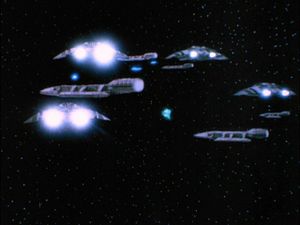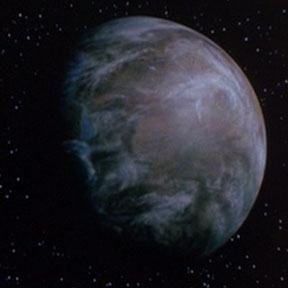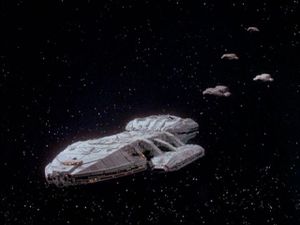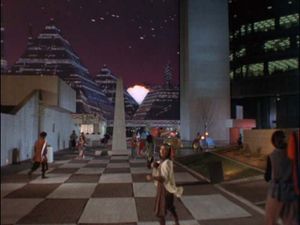The Twelve Colonies of Man
| This page (like all pages on this wiki) was imported from the original English-language Battlestar Wiki based on what was available in the Wayback Machine in early 2017. You can see the archive of the original page here. |
- This article discusses the Twelve Colonies of the Original Series. See The Twelve Colonies of Kobol for information on the Colonies of the Re-imagined Series.
| Part of the series on | |
The Twelve Colonies of Man[1] included the colonies of:
Four colonies, ostensibly similar to the astrological names of "Cancer," "Leo," "Libra" and "Aquarius," are never formally named in Original Series episodes. However, Aquarus is mentioned in the novelization of "The Young Lords."
Contents
Star System
The Twelve Colonies of Man are located in an unnamed multi-star system within the Cyranus Galaxy. The tactical navigation display in Core Command of Galactica (below) indicates there are four local star systems surrounded by 21 planets, including a number of worlds (e.g. Carillon) that are outside the Colonial sphere on influence. Caprica orbits a close double star [2]

History
The government of the Twelve Colonies first encountered the Cylons after the Colonials intervened to protect an alien race known as the Hasari from them. As a result, the Colonies have been at war with the alien Cylons for 1,000 yahren.
First Exodus
According to the Book of the Word, a religious text of the Kobollian faith, humanity began on a planet called Kobol.
After an ecological disaster purported to be created by technology, the tribes of humanity fled outward to the stars. Twelve tribes of Man eventually passed through a magnetic void and settled on a star system of 12 worlds, which would be later known as the Twelve Colonies of Man (TOS: "Lost Planet of the Gods").
A thirteenth tribe made another exodus to a planet known as Earth (TOS: "Saga of a Star World").
War

Recent battles in the Thousand Yahren War included the Battle of Cosmora Archipelago (with Commander Kronus, battlestar Rycon and the Fourth Fleet), the Battle of Caprica, and the Battle of Molecay (with the Fifth Fleet and battlestar Pegasus).
The Thousand Yahren War brutally ended with an elaborate Cylon sneak attack at the Battle of Cimtar, which destroys the last battlestar fleet, led by President Adar (TOS: "Saga of a Star World").
One surviving battlestar, Galactica, escapes destruction and is unable to ward off a simultaneous bombardment of the Twelve Colonies and its populace. Millions, perhaps billions of humans are killed. The survivors escape their worlds to follow Galactica in search of a safer haven. Template:Clear
Colonization

Several planets, moons and asteroid colonies throughout the portion of the galaxy familiar to the Colonials boasted small croppings of Colonials. Some who were well aware of the Colonies and the war with the Cylons (TOS: "The Long Patrol", "The Young Lords"), others knew nothing of them, such as Sectar (TOS: "The Magnificent Warriors"), Equellus (TOS: "The Lost Warrior"), Eastern Alliance, Terra, Paradeen and Lunar Colonies (TOS: "Greetings from Earth", "Experiment in Terra").
Culture
Each of the Twelve Colonies boasted its own race and dialect as to distinguish itself from the others.
Holidays
- Armament Day: a day for celebrating the Colonial Military (TOS: "Lost Planet of the Gods, Part I").
- High Worship of the Sunstorm: a period where the Gemini are permitted to have contact with members of the opposite sex, which occurs every seven years as decreed by the Gemini's High Priests (TOS: "Saga of a Star World").
The Colonies
Aeries
Robber and his family are from Aeries, and there is some suggestion other prisoners on Proteus may be Aerian as well, given their raspy Irish sounding accents which mirror that of Robbers'. Cassiopeia is familiar with the Aerian merchant code as her father was a trader fluent in such things, and may perhaps have been an Aeries himself (TOS: "The Long Patrol").[3]
The non-canonical Encyclopedia Galactica describes Aeries as a small, crowded world. Due to the population surpassing the ability of the planet herself, the Aerians created orbital space stations that were capable of handling the food needs for the colony. From this, they were able to develop special crops adapted to growth in weightless space. A subsquent technology was in the form of the Agro Ships, which were used to provide food for deep-space missions, prior to the invention of the lightspeed drives.[4]
Caprica
Caprica was said to be the world that led the technological renaissance among the Twelve Colonies of Man, rediscovering space flight along the way.[5]
Gemoni
Many of the passengers about the freighter Gemini are from Gemoni[6]. The language of Gemoni is Gemonese (which Boomer can translate and Cassiopeia is able to speak fluently). Gemoni is home to the Otori Sect (TOS: "Saga of a Star World").
Sagitara
Sagitara was located at coordinates 1-2-6 and was, along with Virgon and Caprica, one of the Inner Colonies, first to be attacked. In the novelization, Adama stated that Sagitara had the most advanced defense system in the Colonies. President Adar hailed from Sagitara.
Taura
Starbuck and Boomer run across a blonde Taurus woman.[7] (TOS: "Saga of a Star World").
Virgon
Virgon was located at coordinates 0-3-5 and was, along with Sagitara and Caprica, one of the three Inner Colonies. These were the first to be attacked and destroyed by the Cylon forces.
Notes
- According to Encyclopedia Galactica (a non-canonical piece of merchandise published in 1979):
- After the exodus, the settlers settled on twelve worlds, using their technology to prepare the land and provide "the basic necessities of life". However, once this was done, the settlers shunned their technology as it was blamed for the destruction of Kobol. This leads to the Era of Darkness, where technology was forgotten and the Colonials regressed to a non-high technological period, where religion lead and influenced the lives of the Colonials.
- Being separated for two millennia, the Colonies developed their own cultural identities.
- The Aerians are said to have "quickly separated into a number of hostile groups", tearing the colony apart by "petty wars among them for hundreds of yahren.
- The Capricans were "practical" people, retaining much of the science predating the exodus than the other colonies, thus leading the rest of the Colonials to a scientific renaissance in the Fifth Millennium.
- The Gemonese, who settled the "cold" planet, they condemned pleasure as a "temptation to evil", with the Otori Sect carrying this "ethic to extremes, permitting contact between the sexes" only once during the High Worship of the Sunstorm.
- The Sagittarians "became a contemplative people", producing philosophers throughout the modern era.
- The Scorpios were "blessed with a fertile planet and a gentile climate" devoting "their lives to pursuit of art, music and pleasure".[8]
- After the rediscovery of interstellar travel, each of the colonies joined together and conjoined their efforts to the development of interstellar spacecrafts, bringing 500 yahren of "unparalleled prosperity", establishing settlements on other planets and asteroids, as well as making peaceful contact with intelligent species of other worlds.
- It is said that by the time of first contact with the Cylons, the Colonials technology "had advanced beyond that of their ancestors of Kobol".[9]
- In Galactica 1980, it is indicated that Colonials do not have fingerprints (and presumably, no hand prints either) and that gravity on the Colonies is higher than on Earth's ("Galactica Discovers Earth, Part I"; "The Super Scouts, Part I"). While the lack of fingerprints is also noted[10] in the Galactica Discovers Earth novelization, there is no mention of the gravity differential—as this is introduced in the following episodes—but the Warriors have speed, agility and mental abilities (such as the ability to learn, retain and use languages with the aid of technology) greater than their Earth brothers.[11]
- In the Galactica Discovers Earth novelization, specially trained Galacticans (e.g. Warriors) can use their body's fat deposits as a source of energy for their bodies, in much the same way a bear is able to use its fatty deposits during hibernation. This allows Galacticans the ability to go without eating for weeks at a time during missions or Viper patrols and the system is fully efficient, thus leaving no waste products.[12]
See also
References
- ↑ In the Original Series, the formal name of the unified worlds is the "Twelve Colonies of Man". Its Re-imagined Series counterpart is known as the "Twelve Colonies of Kobol".
- ↑ See the scene in "Saga of a Star World" where Adama examines the remains of his burned out house on Caprica following the Cylon attack. Two suns are visible in the sky.
- ↑ This would be revisited in the Re-imagined Series, where natives of Aerilon are depicted as speaking with a raspy north English Yorkshire accent.
- ↑ Kraus, Bruce (1979). Encyclopedia Galactica, p. 11.
- ↑ The attack on Caprica in the first episode of the series, was filmed at California's Long Beach City Hall, which had been completed in 1976. The pyramids seen don't actually exist — they were added by special effects to appear behind the city hall building.
- ↑ This is the correct Original Series spelling. The Re-imagined Series counterpart is spelled "Gemenon".
- ↑ Judging by Starbuck's reaction to the Taurus' question on how he knew she was a Taurus, and from his taste in women, it can be inferred (despite the claim of recognizing "the dialect") that Taura women may be known for their beauty.
- ↑ Kraus, Bruce (1979). Encyclopedia Galactica, p. 27.
- ↑ Ibid., 28.
- ↑ Resnick, Michael (1981). Battlestar Galactica 5: Galactica Discovers Earth. Berkley Books, p. 47.
- ↑ Ibid., pgs. 106-108
- ↑ Ibid., pgs. 151-152


